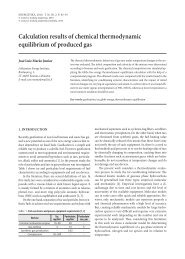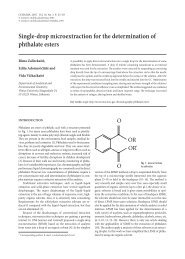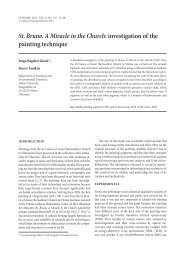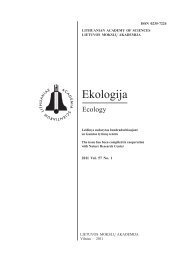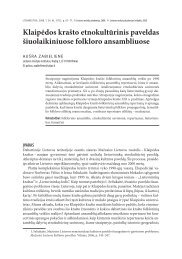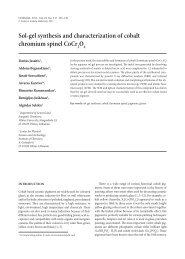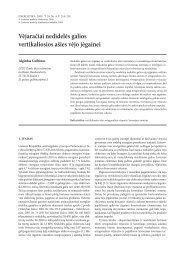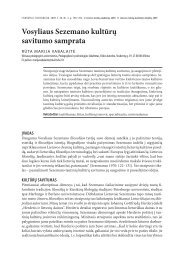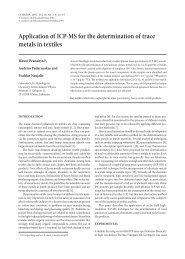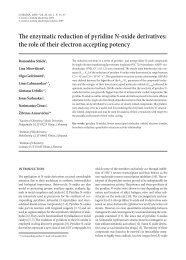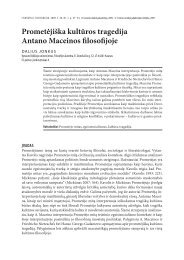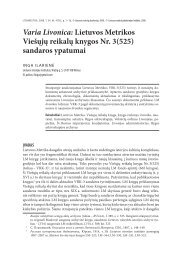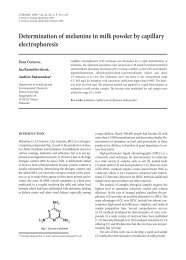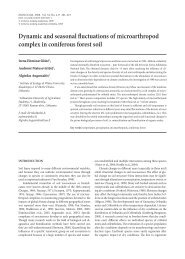58 Filosofija. Sociologija. 2012. T. 23. Nr. 1Kyla klausimas, kiek šie mąstytojai yra Lietuvos ar bent jau lietuvių? Nors M. K. Sarbievijus,L. Karsavinas, V. Sezemanas – Lietuvos, jie tik su didelėmis išlygomis laikytini lietuvių.Tiesa, M. K. Sarbievijus rašė „tikrąja“ (taip skelbė XVI–XVII a. lietuvybės ideologai) lietuvių,t. y. lotynų 12 , o L. Karsavinas ir V. Sezemanas – „vulgariąja“ lietuvių kalba. Pastarieji dumąstytojai svariai prisidėjo prie lietuviškų sąvokų formavimosi. Nors E. Levinas, A. Maceinair A. Mickūnas yra kilę iš Lietuvos ir mokėjo lietuviškai, didžiąją dalį savo brandaus gyvenimojie praleido Vakaruose, kur buvo veikiami kitos mąstymo ir kalbinės aplinkos. Labiausiainutolęs nuo lietuviškosios aplinkos – A. Lingis, gimęs JAV lietuvių šeimoje. Čia krenta į akisstebėtinas dalykas: kalbėdami apie žymiausius Lietuvos (lietuvių) mąstytojus, turime omenyjebūtent šių „problemiškos tapatybės“ filosofų sąrašą. Nors jį galima papildyti vienu kitu „grynuoju“Lietuvos lietuvių mąstytoju, tai nekeičia išryškėjusios tendencijos.Šie problemiški atvejai rodo, kad būti Lietuvos ir lietuvių filosofu – ne tas pats. Toks nesutapimasliudija dvigubą kultūrinę priklausomybę, suponuojančią trauką skirtingoms mąstymoerdvėms, kurias lemia tiek skirtinga kalbinė, tiek mokyklinė aplinka. Mano tezė: autoriausiškilumą lemia jo priklausymas skirtingoms mąstymo ir kalbos aplinkoms. Kitaip tariant,jis yra tiek iškilus, kiek atlieka dvigubo agento vaidmenį: yra tiek išeinantis, tiek ateinantis.Drauge jis – išlydintis tam tikrą mąstymo tradiciją, kurios pilkame fone ryškiai rašo savo stiliumi,ir sutinkantis naujybę, apie kurią jis dar nenutuokia ir kurią sukuria apie jį besiburiantieji.Ši kryžkelė ir yra bet kokios filosofinės mokyklos pradžia. Jei taip, filosofijos mokyklųLietuvoje nėra kaip tik todėl, kad čia pernelyg lietuviška aplinka, neugdanti iškilių mąstytojų.Tuo neteigiu, kad iškilius mąstytojus gimdo globali kultūra. Priešingai, jų vieta – tam tikramemąstymo regione, kurio ribas jie perkelia. Tačiau mąstymo regionas – visada tektoninių lūžiųvieta, kurią išjudina tiek jos tarpinė padėtis, tiek mąstytojo iškilumas.Grįžkime prie klausimo, ar būtina cituoti Lietuvos (lietuvių) autorius. Nors jauniejifilosofai orientuojami į Lietuvos mąstymo kontekstą, vos apsigynę disertacijas jie dažniausiai„išauga“ šias varžančias „kelnytes“ apeliuodami į pasaulines figūras be jokių tarpininkųLietuvoje. Mano tezė: Lietuvos (lietuvių) filosofinio konteksto ignoravimas išreiškia nevisavertiškumokompleksą, t. y. gėdą ir kaltę dėl gimtosios aplinkos, kurioje „niekas nevyksta“,kitaip tariant, nėra iškilaus mąstymo, kurį užtikrina savarankiškos filosofijos mokyklos.Tai – dvasinė emigracija į kitus kontekstus. Paradoksas, kad ši emigracija giliame Lietuvosužkampyje įkalina emigrantus, kurie pasmerkti aptarnauti iškilius Vakarų mąstytojus. Skirtingainei minėti dvigubi kultūrų agentai, šie emigrantai atsiduria „niekur“: savąjį mąstymoregioną jie ignoruoja, o į kitą neįsiterpia būtent dėl savo „išplauto“ tapatumo. Ir atvirkščiai,nuorodos į Lietuvos (lietuvių) autorius – savo kalbinės minties aplinkos apsibrėžimas siekiantiškilaus tapatumo. Taigi Lietuvos (lietuvių) autorių citavimui reikia tam tikros drąsos,kuri paprastai būdinga iškiliam filosofijos tekstų rašytojui, buriančiam tam tikro mąstymoregiono filosofijos mokyklą.IšvadosKlausimas apie filosofijos tekstų <strong>lituanistiniu</strong>s <strong>aspektu</strong>s nukreipia link kalbos ir mąstymoregiono, kurio aplinkoje atsiranda tam tikras filosofų bendrijos minties kryptingumas, būdingasfilosofijos mokyklai. Viena, ant filosofijos mokyklos bangos iškyla autoriai, kuriuos12Čia galime prisiminti ir M. K. Sarbievijaus amžininkus – Ž. Liauksminą bei M. Smigleckį, kurietaip pat rašė lotyniškai. Šie trys iškilūs Vilniaus universiteto mąstytojai, plėtoję estetiką bei poetiką,logiką ir retoriką, leidžia kalbėti apie tam tikrą mąstymo bangą, t. y. Lietuvos filosofijos mokyklosužuomazgą.
Tomas Kačerauskas. <strong>Filosofijos</strong> <strong>tekstai</strong> <strong>lituanistiniu</strong> <strong>aspektu</strong>59ir vadiname iškiliais. Kita, filosofijos mokyklos buriasi apie iškilius mąstytojus. Pastarieji dažniausiaiužima tarpinę padėtį tiek idėjų aplinkos, tiek mąstymo kalbos atžvilgiu. Išaugę iš tamtikro regiono, jie rodo kitą mąstymo ir kalbos horizontą.Gauta 2012 01 23Priimta 2012 02 27Literatūra1. Gedutis, A. 2010. „Filosofija Lietuvoje po 1989: ką apie tai byloja lietuviški akademiniai žurnalai?“,Problemos 78: 7–21.2. Heideggeris, M. 1992. „Būtis ir laikas (ištraukos)“, iš M. Heideggeris, Rinktiniai raštai, vert. A. Šliogeris.Vilnius: Mintis, 63–97.3. Heidegger, M. 2006. Sein und Zeit. Tübingen: Max Niemeyer Verlag.4. Heidegger, M. 1997. Unterwegs zur Sprache. Stuttgart: Verlag Günter Neske.5. Heidegger, M.; Gadamer, H. G. 2003. Meno kūrinio ištaka. Vert. T. Sodeika, J. Jonutytė. Vilnius: Aidai.6. Kačerauskas, T. 2011. „Ar vertimas – kūrybos industrijų veikla? M. Heideggerio vertimo atvejis“,Santalka: filosofija, komunikacija 19(2): 98–107.7. Sverdiolas, A. 2003. Aiškinimo ratas. Hermeneutinės filosofijos studijos 2. Vilnius: Strofa.TOMAS KAČERAUSKASPhilosophical texts from the point of view of theLithuanian languageSummaryThe article deals with the aspects of the Lithuanian language in philosophical texts.According to the author, the language and thought are inseparable. Every thinker isalso a translator who introduces the translated concepts. According to the author, thetranslated concepts can be reasoned only in the context of translation. In the conflictof the translated concepts, the winners are the concepts suggested by the most prominenttranslators instead of the most exact concepts. According to the author, the exactphilosophical translation is not only impossible because of different seeing of differentnations but also harmful, distancing from the original by violating the hermeneuticalharmony of the native language. The article deals with the question of philosophicalschools. The author stresses that such a school is possible only having outstanding authorswho take an intermediary position between different thinkings, seeings and speakings.The ignorance of the Lithuanian context expresses not as much the lack of thephilosophical school as an inferiority complex because of the native environment wherethere is “not a stir”.Key words: language and thought, translations and translated concepts, prominent author,philosophical school



